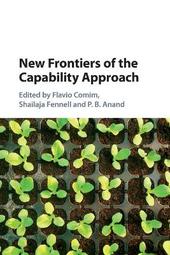
|
New Frontiers of the Capability Approach
Paperback / softback
Main Details
| Title |
New Frontiers of the Capability Approach
|
| Authors and Contributors |
Edited by Flavio Comim
|
|
Edited by Shailaja Fennell
|
|
Edited by P. B. Anand
|
| Physical Properties |
| Format:Paperback / softback | | Pages:670 | | Dimensions(mm): Height 228,Width 151 |
|
| Category/Genre | Economics
Economic theory and philosophy
Labour economics
Development economics |
|---|
| ISBN/Barcode |
9781108448185
|
| Classifications | Dewey:330.1556 |
|---|
| Audience | | Professional & Vocational | |
|---|
| Illustrations |
Worked examples or Exercises
|
|
Publishing Details |
| Publisher |
Cambridge University Press
|
| Imprint |
Cambridge University Press
|
| Publication Date |
3 June 2021 |
| Publication Country |
United Kingdom
|
Description
For over three decades, the capability approach proposed and developed by Amartya Sen and Martha Nussbaum has had a distinct impact on development theories and approaches because it goes beyond an economic conception of development and engages with the normative aspects of development. This book explores the new frontiers of the capability approach and its links to human development in three main areas. First, it delves into the philosophical foundations of the approach, re-examining its links to concepts of common good, collective agency and epistemic diversity. Secondly, it addresses its 'operational frontier', aiming to give inclusive explanations of some of the most advanced methods available for capability researchers. Thirdly, it offers a wide range of the applications of this approach, as carried out by a mix of renowned capability scholars and researchers from different disciplines. This broad interdisciplinary range includes the areas of human and sustainable development, inequalities, labour markets, education, special needs, cities, urban planning, housing, social capital and happiness studies, among others.
Author Biography
Flavio Comim is an associate professor at the University Ramon Llull/IQS in Spain and an affiliated lecturer at the Centre of Development Studies, University of Cambridge. He has been a consultant for UNESCO, UNEP, FAO, WHO and UNDP. He co-edited the books The Capability Approach: Concepts, Measures and Applications (Cambridge, 2008), with Mozaffar Qizilbash and Sabina Alkire and Capabilities, Gender, Equality (Cambridge, 2014), with Martha Nussbaum. Shailaja Fennell is Lecturer in Development Studies at the University of Cambridge. Her previous publications include Rules, Rubrics and Riches: The Interrelations between Legal Reform and International Development (2010) and Gender Education and Equality in a Global Context: Conceptual Frameworks and Policy Perspectives (ed with M. Arnot, 2008). P. B. Anand is Reader in Environmental Economics and Public Policy at the University of Bradford where he has been teaching since 1998. His previous works include his book Scarcity, Entitlements and the Economics of Water in Developing Countries (2007) and papers on applying the capability approach to issues related to access to water and sustainability.
Reviews'Because of its breadth and depth, this book does not explore just the frontiers of the Capability Approach but also the frontiers of social and economic studies in well-being, freedom and justice. Building bridges between disciplines and tackling diverse topical issues, it represents a real challenge to conventional perspectives on development and quality of life. It is also a great resource for scholars of the capability approaches, both for the fascinating reconstruction by Gay Meeks of the evolution of Amartya Sen's thought and for the other excellent chapters that push the boundaries of the framework.' Pasquale De Muro, Universita degli Studi Roma Tre 'The capabilities approach (CA), and its associated insistence on understanding poverty as a multidimensional phenomenon, is now an established field of scholarship and practice in international development. By simultaneously striving to fortify its theoretical foundations, methodological instruments and policy applications, those extending the pioneering contributions of CA's famous founders now preside over a sophisticated, mature and fruitful body of work. This volume amply showcases both the breadth and depth of these efforts, manifest in an array of countries and sectors.' Michael Woolcock, World Bank and Harvard University, Massachusetts
|